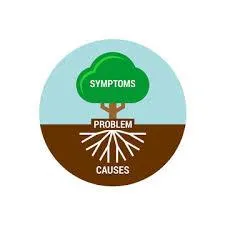READ OUR LATEST BLOG POSTS

The Role of Functional Medicine in Weight Loss
The Role of Functional Medicine in Weight Loss: Addressing the Root Causes
When it comes to weight loss, many people turn to the latest diet fad, intense exercise routines, or restrictive meal plans in the hopes of shedding pounds. While these methods can lead to short-term results, they often don't address the underlying causes of weight gain, which may be due to imbalances in your body that go far beyond calories in and calories out. This is where functional medicine comes in.
What is Functional Medicine?
Functional medicine is a patient-centered approach that seeks to identify and address the root causes of illness rather than simply managing symptoms. By focusing on the interactions between genetics, environment, and lifestyle, functional medicine practitioners aim to uncover the underlying factors contributing to health problems, including those related to weight gain.
In the context of weight loss, functional medicine takes a comprehensive approach that goes far beyond diet and exercise. It involves personalized treatment plans that address the complex interplay of hormones, gut health, nutrient deficiencies, and lifestyle factors to restore balance and promote lasting weight loss.
1. Hormonal Imbalances and Weight Gain
Hormones play a significant role in regulating your metabolism, appetite, and fat storage. For example, imbalances in thyroid hormones can slow down your metabolism, making it difficult to lose weight. Similarly, elevated levels of cortisol (a stress hormone) can lead to fat storage, particularly around the abdominal area. Insulin resistance, often linked to conditions like polycystic ovary syndrome (PCOS), can also lead to weight gain and difficulty losing weight.
Functional medicine practitioners assess hormone levels and work with patients to balance them naturally, helping to support weight loss. Treatment might include nutritional changes, herbal support, and lifestyle modifications, which can help restore hormonal balance and optimize metabolic function.
2. Gut Health and Weight Loss
The gut is often referred to as the "second brain" because of its powerful impact on overall health, including weight management. An imbalance in the gut microbiome can lead to inflammation, insulin resistance, and poor nutrient absorption, all of which can contribute to weight gain. Conditions like leaky gut, where the intestinal lining becomes damaged and allows toxins to enter the bloodstream, can further complicate weight loss efforts.
Functional medicine addresses gut health by recommending dietary changes to reduce inflammation, restore balance to the microbiome, and improve digestion. This might include eliminating food sensitivities, incorporating more gut-friendly foods like fermented foods, and using probiotics or other supplements to support the gut.
3. Detoxification and Metabolism
Your body is constantly exposed to environmental toxins, from the food we eat to the air we breathe. These toxins can accumulate in fat cells, making it harder for the body to burn fat effectively. Furthermore, a sluggish liver or impaired detoxification system can hinder the process of removing these toxins, slowing down your metabolism and leading to weight gain.
Functional medicine practitioners focus on supporting the body’s natural detoxification systems, including the liver, kidneys, and digestive system. This could involve dietary changes, herbal supplements, or specific protocols to help the body efficiently eliminate toxins and promote fat burning.
4. Stress and Sleep: The Weight Loss Connection
Stress and sleep are often overlooked but play a huge role in weight management. Chronic stress can increase cortisol levels, which, as mentioned earlier, contribute to weight gain, especially in the abdominal region. Poor sleep quality can also disrupt hormones related to appetite, making it harder to regulate hunger and cravings.
Functional medicine addresses these factors by incorporating stress management techniques, such as mindfulness, meditation, or yoga, as well as recommending sleep hygiene practices and nutritional support to promote better sleep. Proper rest and stress management are critical for balancing hormones, supporting metabolism, and making weight loss easier.
5. Nutrient Deficiencies
Nutrient deficiencies are another common issue that can hinder weight loss. For example, a lack of vitamin D can contribute to insulin resistance and fat storage, while inadequate levels of magnesium can impact sleep quality and stress management. Functional medicine practitioners often run lab tests to identify nutrient deficiencies and recommend tailored supplements to help fill the gaps.
By ensuring that your body has the right nutrients to function optimally, functional medicine can help support metabolic processes and facilitate more effective weight loss.
6. Personalized Diet and Lifestyle Plans
One of the hallmarks of functional medicine is its personalized approach to treatment. There is no one-size-fits-all solution to weight loss, and functional medicine recognizes that. Instead of promoting generic diet plans, functional medicine practitioners work with patients to create individualized strategies based on their unique health history, lifestyle, and goals.
This personalized approach includes not only diet and exercise recommendations but also stress management, sleep hygiene, and other lifestyle factors that impact weight. By addressing the whole person rather than just the symptoms, functional medicine helps people achieve long-term weight loss success.
Conclusion
Weight loss isn’t just about counting calories or hitting the gym hard—it’s about understanding and addressing the root causes of weight gain. Functional medicine provides a holistic approach to weight loss by taking into account factors like hormone imbalances, gut health, detoxification, sleep, stress, and nutrient deficiencies. By identifying and treating the underlying causes, functional medicine empowers individuals to achieve lasting, sustainable weight loss while improving overall health and well-being.
If you're struggling to lose weight despite your best efforts, functional medicine might be the missing piece of the puzzle. By working with our team who understands the complexities of your body, you can uncover the root causes of your weight issues and create a plan tailored specifically to your needs.




